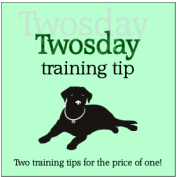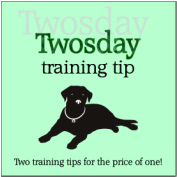 TIP #1: PANCREATITIS RISK The holidays bring a lot of guests into homes where dogs are inevitably being fed table scraps, and perhaps even helping themselves to an entire dinner! As a result of eating a high fat meal, some dogs suffer from pancreatitis around holidays. Pancreatitis is the inflammation of the pancreas, which is an organ integral to the digestive tract. The inflammation disrupts the natural flow of enzymes secreted by the pancreas, resulting in an interruption in the normal digestion of food. If you are hosting a holiday this year, these are the symptoms you should watch for the day after the holiday:
If your dog starts to show any of the symptoms listed above, please visit your veterinarian immediately. The long-term effects of pancreatitis can be very dangerous and life threatening, so please do not wait to contact your local or emergency vet. - excerpted from positively.com TIP #2: BODY LANGUAGE IN CONTEXT Dogs communicate primarily through body language. But just like some of our spoken words have different meanings, so do a dog's signals. A yawn could mean a dog is tired, or it could mean he is releasing stress. A wagging tail doesn't necessarily say "happy dog". If the rest of his body is stiff it could be a warning sign. If the dog is slinking away while wagging his tail he could be saying he is fearful and not a threat. A dog's body language signals are not black and white. You have to look at them individually as well as a whole, and they must be looked at in the full context of what events are occurring around the dog at the time. Duncan has worked with at least 3 other trainers to try to get his fear aggression towards strangers under control. Tonight was our second time meeting, and within 10 minutes I took his leash off and he was happily interacting with me. Ah, the power of positive reinforcement!
 "I used to look at my dog and think 'if you were a little smarter you could tell me what you were thinking', and he'd look at me like he was saying 'if you were a little smarter, I wouldn't have to.'" - Fred Jungclaus  TIP #1: ARE YOU REWARDING YOUR DOG OR YOURSELF? When rewarding your dog, don't confuse your fun with the dog's fun. Get in the habit of carefully observing your dog's response to your rewards, but also observe his response to training overall. Does he quickly engage with you any time you initiate a training session? Or does he dodge your gaze and wander off when he hears you call, or sees you gathering your training equipment? If he responds with the latter, you need to rethink your sessions. - excerpted from the Whole Dog Journal TIP #2: CRATE CRAZY Does your dog get crazy when you leave him out of the crate when you get home? Try the following. First, the time to practice is when your dog has been out of the crate and is relatively calm. Put him in the crate, close the door, open the crate door and, when he steps out, have him sit followed by a food reward and praise. Now, put your dog back into the crate and repeat this 10 times a session, several times a day until this calm crate exiting strategy becomes a habit. Remember to be calm yourself when greeting your dog. Buster learned how to Leave It, Wait, and Stay tonight. We were also able to work on his
over-reaction to triggers at the door, although we will get into that more in the coming weeks. We had our initial meeting with Duncan, a 3-year old Terrier mix. We will be helping
Duncan overcome is fear aggression towards strangers and other dogs. Our busy weekend, and Tyson's basic manners training, concluded by teaching him how to heel and walk nicely on a loose leash. While we were there we also had guests arrive
which enabled us to work on polite greetings. Mya wrapped up her basic manners program by learning Heel, Loose Leash Walking, and how to properly greet people. She is normally a big puller, but when reinforced for the behavior we did want she did really well!
Today we taught Jumper how to Leave It. We started in the house until he grasped the
concept, and then we moved outside to the things he likes to torment most - the horses and cats! Even though he just learned it he actually did pretty well, but practice will make it better. |
AuthorJeff Dentler, CPDT-KA, IAABC-ADT, FFCP, CTDI Archives
April 2024
Categories |


 RSS Feed
RSS Feed